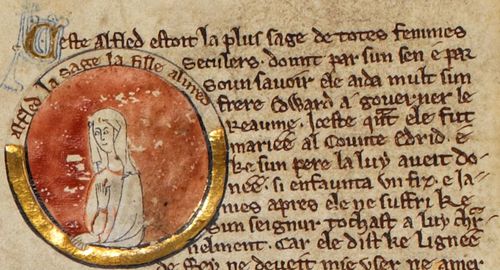
An illustration of Aethelflaed in a medieval manuscript. (London, British Library, MS Royal 14 B V)
Aethelflaed (c. 870-918 CE) was the daughter of Alfred the Great, who was king of Wessex from 871 to 899. When she was a young girl, her father recaptured part of England from the Viking invaders who had conquered it. As a teenager, Aethelflaed married Aethelred, Lord of the Mercians, and reunited the territories of Wessex and Mercia through their marriage. Together, she and her husband ruled their territory, fortified their land, and gave generous support to local churches. They also protected Mercia from Vikings alongside Aethelflaed’s brother, Edward.
After her only daughter, Aelfwynn, was born, Aethelflaed reportedly refused to risk having any more children This was a wise decision, as pregnancy and childbirth were extremely dangerous in the Middle Ages. It was rare for medieval women to refuse to bear children, but Aethelflaed must have stood her ground bravely.
Aethelred died in 911, but he had probably been ill for several years. Aethelflaed had most likely been helping to rule for several years as he grew more and more sick. Most widows would have remarried or retired to a convent, but Aethelflaed ruled alone as Lady of the Mercians for the rest of her life. She is the only female ruler in Anglo-Saxon history. As ruler, she acted to protect her lands from the Vikings, sending armies to defend against them and capture back lost territory. She must have been formidable, because we know that several Danish-ruled towns submitted to her without a fight. She succeeded in winning back many towns and territories lost to the Danish.
When Aethelflaed died in 918, she named her daughter her successor. This was the first and only time in history that one Anglo-Saxon queen succeeded another, but it was short-lived, as Aelfwynn was quickly deposed by her uncle Edward. Medieval historians admired Aethelflaed’s strength and bravery, and praised her accomplishments. One writer, Henry of Huntingdon, called her “queen by title, but in deeds a king,” and said that, “heroes before the Mercian heroine quail’d; Caesar himself to win such glory fail’d.”
